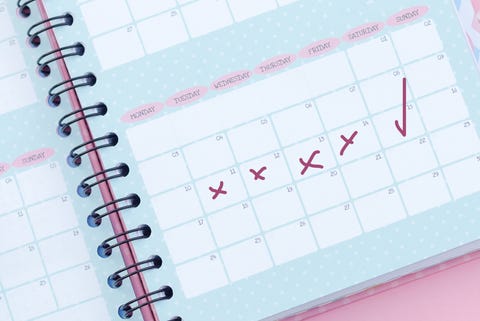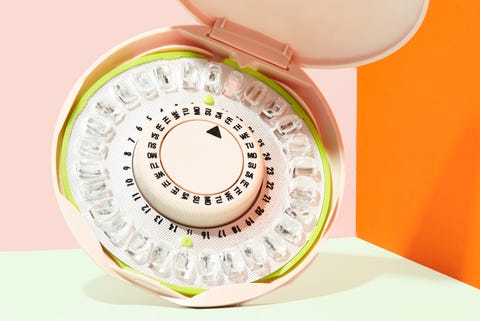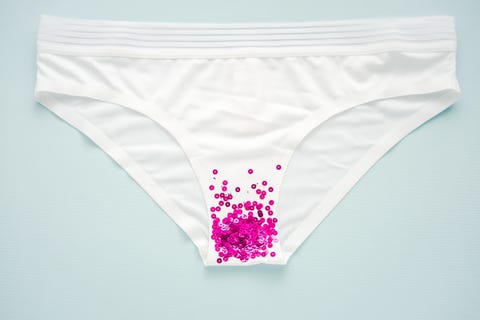Your period: It’s been coming around once a month since your *NSYNC days. And yet, plenty of us don’t know all that much about it, or pay much attention to the nitty-gritty of what our bodies are going through. Instead, we just kinda sit back and wait for the cramping and craziness to be over. But that’s a mistake.
The length of your cycle, how heavy it is, and how it affects the rest of your life can give you important insight into your overall health—so it’s time to start paying attention if you’re not already. Use this quick quiz as a prompt to start thinking more about your period patterns and what they might mean for your overall wellbeing.
Carol YepesGetty Images
The answer: Fact—sort of
Most women get their period for four to five days, according to the Centers for Disease Control and Prevention (CDC), but a flow lasting up to eight days fits into the realm of normal, notes the Office on Women’s Health (OWH).
As for periods that tend to hang around for longer? They’re worth talking about with your gynecologist. They could be a sign of heavy periods, or abnormal uterine bleeding, a condition that the CDC says affects one in five women.
Shana NovakGetty Images
The answer: Nah
Yes, a happy side effect of hormonal birth control pills and IUDs is that they can make your period more regular and reduce the amount that you bleed. But there are other options out there if you struggle with heavy or painful periods.
One option is endometrial ablation. During the minimally invasive procedure, a doctor removes the lining of the uterus to control or eliminate menstrual bleeding. One thing worth noting: Endometrial ablation is only recommended for women who are finished childbearing as pregnancy following this procedure can be dangerous. (Learn more about the procedure here.)
If your doctor suspects that uterine polyps or fibroids are causing your period problems, they can be removed, too, according to the CDC. Surgical removal of fibroids can range from minimally invasive procedures like operative hysteroscopy or more serious surgery like hysterectomy, which involves removing the entire uterus.
JulyProkopivGetty Images
The answer: True
It might look like more, but the average woman only loses two to three tablespoons of blood during her period, the CDC says. Of course, tracking exactly how much you bleed would be kind of… impossible. (Unless you use a menstrual cup. But still! Come on!)
Just take note of how many tampons or pads you typically need to use, as well as their absorbency, and give your gynecologist a heads up if it seems like things are changing.
VolanthevistGetty Images
The answer: False
Sure, some days will be heavier than others—and everyone’s idea of “heavy” is different. But in general, soaking through a pad or tampon every hour for several hours, having to change pads in the middle of the night, or having to double up on pads to avoid staining your clothing are signs that something might be wrong, the CDC says.
The same goes for blood clots that look bigger than a quarter. If any of those things sound like what you experience on your period, it’s time to call the gyno. (This handy doc can help you prep for that convo.)
JulyProkopivGetty Images
The answer: True
Heavy periods aren’t just annoying. They could put you at risk for anemia, a condition where your blood isn’t able to carry enough oxygen to the rest of your body. This might leave you feeling weak, tired, short of breath, and headache-y or dizzy. You could even get an irregular heartbeat, notes the National Heart, Lung, and Blood Institute (NHLBI).
Additionally, it’s possible that abnormal uterine bleeding can take a toll on your mental health. In a survey sponsored by Hologic of 1,003 women who self-identified as currently or recently experiencing heavy bleeding, 42 percent said they feel depressed when their period is at its heaviest.
Towfiqu PhotographyGetty Images
The answer: False (thank goodness!)
Mild cramping, bloating, or fatigue is one thing, but severe abdominal pain or exhaustion that stops you from doing your usual activities is another. The bottom line is that your period shouldn’t interfere with your life, so if your symptoms are so bad that you can’t do the things you enjoy, talk with your gynecologist. It doesn’t have to be that way.
Source: Read Full Article





